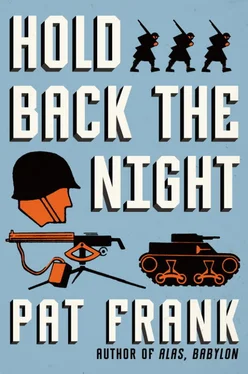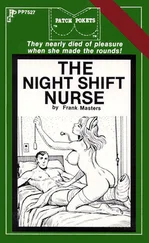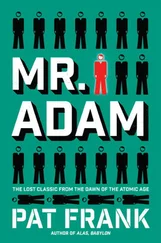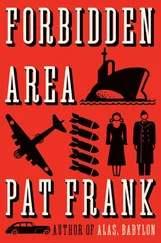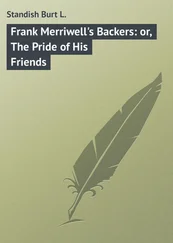Ekland looked around at the world that held them, like a barred cell of rock and ice. “No, sir.”
“I’ll show you. Bring me those helmets.” He gestured at the dead, and watched as the sergeant stripped the dead of their helmets. Then the captain walked to a ledge of rock from which hung ice daggers downward pointed, and began to knock them away with the butt of his carbine. The sergeant filled the helmets with broken ice.
The sergeant waited to see where the captain would make his fire. Mackenzie pointed to the four jericans they would not take along. “Pour these over the vehicles,” he ordered. When the jeeps were saturated the sergeant set the three ice-packed helmets on one of the seats, and then set both jeeps afire. They burned hot and bright for ten minutes, and the captain allowed his men to crowd as close as they dared.
When the fire died he half-filled his canteen from the water in the helmets, and his men lined up and filled theirs. Then he shouted them into movement, and shepherded them into column as he wanted them, with Ekland and the automatic rifle in front, and Ackerman and his bazooka in the rear.
As they strung out along the road, stumbling in the frozen ruts of the ox carts, they bore no resemblance to a company of Marines, or even the remnants of a company. Nothing like them had ever been seen on the parade grounds of Quantico and Lejeune. Yet they were Marines, and armed, and on the move. They would fight, and they were dangerous.
Mackenzie took the lead, his carbine snug against his back and the bottle of Scotch tucked like a football under his arm. As they rounded the first bend of the road he shoved the bottle into the pocket of his parka, alongside the map, and glanced back at the crest of the hill across the gorge. The Mongol horsemen had vanished. He suspected he would see them again.
ONCE THE MEN were in their stride, the captain timed their progress, counting the cadence in his head, and was surprised to find that their pace was as good as you would expect from boys still in boot camp, well-nourished, fresh, and strong, hiking over the Carolina hills. His men of Dog Company might be bedraggled, and sick with weariness and apprehension, but they had been tempered to an inner hardness by the blowtorch of battle.
He saw nothing of the enemy, but he knew they were there. This new enemy was not orthodox. This new enemy did not expose itself except on ground, and at a time, of its own choosing. Then it rose, as if birthed on the spot by the mud of Asia, in full strength and ferocity. A five-star general had discovered this, the hard way, in Tokyo, and Mackenzie had discovered it, the hard way, at the reservoir. This new enemy slithered around your flanks, and stabbed your rear, and ate at your guts. You could not put your hands on him. It was like trying to strangle a jellyfish.
At the end of an hour, when he reached a turn where he had a clear field of fire on both flanks, and a precipice rising at his rear, he called, “Okay, take a break.” His men halted, and carefully laid down their weapons, in the manner of veterans, and then propped themselves against the rocks.
Mackenzie busied himself building a small pyre of pebbles and what loose earth there was, and Sergeant Ekland, sensing the captain’s intent, joined him and jabbed and scraped the iron earth with his bayonet. “Trick I learned from a fellow who was in the Aleutians,” the captain explained. “No fuel there, either.”
Then he called for the jericans, and emptied on the pyre a gallon from each. When the gasoline had soaked well into the stones and earth, he touched his lighter to it, and it blazed like a great torch. “Good for eight minutes, maybe ten,” the captain said. He stripped off his gloves and flexed his lean hands before the fire, and pushed back the hood of his parka and took off his helmet and his alpaca pile helmet-liner, and scratched his itching scalp. Then he squatted on the ground.
The men packed close around him, and he overheard a whisper, “He’s a hard bastard, but not dumb.” The corners of his mouth smiled, and he looked sideways at Ekland, and he saw that Ekland too had overheard, and was smiling behind the red beard. While they were separated by the tricky chasm between officers and men, the captain found that he and Ekland often thought alike, and acted alike. And while they never spoke of it, it was the captain’s belief that their aims and ideals were close kin—that both enjoyed the magnificent independence and occasional loneliness of free men.
Ekland said, “Sir, do you think we could split up a few of the cigarettes?”
“Okay,” the captain agreed. He broke out four cigarettes. “One to four men,” he said. He knew Ackerman didn’t smoke. They crowded the fire and burned up the cigarettes, inhaling deep, and when their fingers scorched they impaled the yellow ends on sharpened match sticks for a last puff. Mackenzie shared his cigarette with Ekland and Ostergaard and Joe Kato, the lazy Hawaiian boy whose surprising agility with languages made him a valuable asset in the linguistic morass of Asia, so that he had become a PFC and the unofficial interpreter for the captain. Captains weren’t assigned interpreters, but this captain, by the luck of orders, had one, and had found good use for him. Mackenzie had discovered America deficient in one technical weapon of war—the languages of other peoples.
Kato took the last drag on the captain’s cigarette, and said, “Sir, tell us more about that bottle of Scotch. Weren’t you ever tempted?”
“Yeah,” Beany Smith said. “How come you never drank it? Nothing big ever happen?”
Mackenzie laughed. “Big things happened-at least they seemed big at the time. Lots of times I almost opened it. I almost drank it at Guadalcanal, after I was hit when the Japs attacked on the Tenaru. I had shrapnel in my back, and I could hear the Japs prowling around in the night, and I had to lay there quiet, in my hole, until morning, and I almost drank it then.”
“Why didn’t you?” Beany Smith asked, somewhat awed.
“I wanted it bad enough, God knows. I didn’t have any morphine syrettes, and I was afraid to yell for the aid men. Every once in a while, that night, I’d hear a scream and a scuffle, and I knew that a Jap had fallen into somebody’s foxhole, and that one or the other was dead. I started to open the Scotch. I figured four or five drinks would put me out of pain. But I didn’t open it because I was afraid I’d drink too much and pass out, and a Jap would slip into my hole and murder me.”
“Like we were murdered at Ko-Bong,” Ostergaard said, and then realized that he had said something clumsy, and wished he hadn’t said it.
“Yes,” Mackenzie said, accepting the blame, “as we were murdered at Ko-Bong.”
Then Mackenzie told them of Guadalcanal, of the stinking jungle and the weird Banzai charges, and the uncertain days after the Navy lost four cruisers off Savo Island, and the thin-hulled transports fled the beach. He told how the lonely Marines lay in the mud while the Japanese battleships steamed past, hurling 14-inch shells down upon them, lording it over the night.
As Mackenzie talked he kept looking over the shoulders of his men, examining the cone-shaped hills on the other side of the gorge, and the road as far as he could see it. He noted that Ekland, like an experienced hunter in the field, always searching for signs of movement, did the same.
Mackenzie spoke of malaria, and dysentery, and jungle rot, and the crud. He told them of the foot-long centipedes that would creep between your belt and waistband in the night, and fasten on your thumb in the morning, and leave you screaming in agony like childbirth for a full day. He spoke of the leeches that fell from the trees to suck your blood, and the ants with a bite like hot pokers, and the wasps three inches long, and the three-foot lizards, and spiders big as dinner plates. He told of men brained by falling coconuts and rotten trees, and the stealthy crocodiles, and the stench of the enemy’s abandoned dead, so you retched before your morning coffee.
Читать дальше
